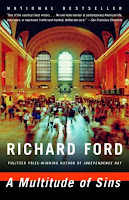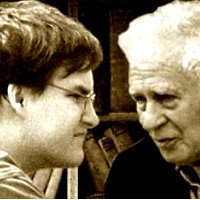
Steven Spielberg isn’t my favorite directors but one needs admit that he doesn’t make a dull movie; the one thing he remembered all that time in film school was that movies move , and that what we see moving across the screen would be impressive, memorable, larger than proverbial life itself.Spielberg understands spectacle the same way Cecil B.DeMille or D.W.Griffith did, with internal coherence in narrative structure and development being quietly absorbed by the need to advance his enormous fantasies forward, at a rapid clip, with each frame burnished, highlighted and processed for maximum defamiliarization. He doesn't let you forget that you're watching a movie, and that's a good thing. Stasis I can get by staying home.
That’s not to say that Spielberg hasn’t problems , major ones. Pandering? The deliverance of obvious an morality? A unfailingly black and white world in his movies, full of cause and effect and not much else? All these matters, the things that prevent one from admiring Spielberg’s movies beyond his untouchable technical mastery, are the stuff critics will hash out for years. Still, we will continue to see his films and argue over the relative merits of the small matters that nag for your attention.
War of the Worlds, revived by director Steven Spielberg, is a satisfying special effects orgy that makes the devastation of the earth, in this case New Jersey to Boston, a cool and at times, yes, scary spectacle to witness on a big screen in a dark theatre.
The Martian Tripods, resembling something very wormy and metallic, are especially stunning constructions of computer animation, with the death beams they fire unto helpless city blocks and citizens seem especially formidable devices to avoid during a full scale panic. What works well, I think, is the view from the ground up: Spielberg's camera positions camera is upwards upward, from below, which provides an alarming scale of things going over head; this underscores a line delivered later in the film by a character (well played by Tim Robbins) that what is happening on earth is not a war, since a war implies a battle between nominally equal sides. "This is not a war" he says, "this is an extermination." There is an appealing air of paranoia here--Spielberg, if nothing else, can create tense airs of sensory overload. Also, the fact that we can only guess as to what horrible purpose the aliens are using their human captives for makes our imaginations work overtime constructing the cruelest mad scientist project the mind of a twisted twelve year old boy can muster.
The ending is faithful to the Wells novel, which makes for an unsatisfying conclusion to an otherwise brilliantly arranged piece of cinematic catastrophe. As the menacing tripods stall, fall over, die, brought to their seamless knees by earth's native microbes, Wells hands Spielberg an excuse to indulge in his worst habit, of wrapping up thing up in a family-values cloak that never fails to ring false. Every character who matters t the hero is present at the close of the movie, and the going here becomes so cornball that you half expect ET to emerge and make magic amends for the sad, unfortunate invasion. A hasty gear switch here, a jolt to the sensibilities.
The weakest link in the film is Tom Cruise; he's gotten some good notices for his performance, but as in all his roles, he seems here only adequate to the star turn. Like Kenneau Reeves, Cruise is a wind up toy, albeit one blessed with some actorly grace. Ironically, his acting reminds me of the early days of computer animation when experimenting animators tried to get the slightest nuance of human emotion , gesture and facial movement; so close, yet so alarmingly false to the source. Distance here is not a blessing. Happily, Spielberg seems to have a way of keeping Cruise's facsimilie emotions under control, and puts his range to get use, same as he did with his mostly impressive version of Philip K. Dick's novel
Minority Report. That film is worth a rental if you haven't seen it, but be warned, it is marred with the Spielberg ending , gratuitous hearts and flowers. The man cannot seem to bear to allow a grim story to remain grim, start to finish.Was Steven Spielberg exploiting 9/11 with his added element of terrorism and “sleeper cells” in his remake of
War of the Worlds?The question is inevitable, really. Had 9/11 not happened, there would writers searching for a lapse in ethical production with a question or two about whether the director was exploiting the Oklahoma bombing for topical subtext, with the Michigan Militia taking the place of Al Qaeda as the sublimated fifth column represented in the film. But 9/11 and Al Qaeda it is, and there defenders to Spielberg’s use of the attack as an undercurrent in is remake. Slate’s reviewer, David Edelstein, one of the better film critics working, goes overboard and maintains that Spielberg had earned the right to tailor his film to mirror the current paranoid state. It’s the sort of argument that uses every item on the shelf one can throw at, which makes the defense breathless, barely aware of its own absurdity. The first question to Edelstein's quick-draw defense is who among us hadn't earned the right to discuss, depict, interpret and frame the attack by dint surviving it , witnessing it, grieving and raging over it? Spielberg has his right to conceptualize his meanings of 9/11 all he wants, but his right to the material supersedes no one else's who was here, on this soil, American-born.
Precisely how Spielberg "earned the right" to invoke 9/11 in War of the Words isn't clear in David Edelstein's defense. Despite what the headline of the story implies, there is no gauntlet that Spielberg had to run, no set of noble tasks he had to perform, no spectacularly patriotic deeds he had to commit in order to gain the moral right to refer to 9/11 in his work. As is, the only rights he needed are those afforded him by the Constitution and the Bill of Rights; the fact that he's a fantastically successful director whose name means large profits didn't hurt him either. I doubt there was much mulling over his "right" to make transparent allusions to 9/11 while the film was in production, or even under discussion.
For all the rest of it, War of the Worlds is typical Spielberg fair, blatantly pushing hot buttons, skirting the edge of the gross and edgy, but reeling back from the abyss for the fabled Hollywood Uplift that have made analyzing his films useless beyond a certain technical appraisal. Spielberg makes spectacles, loud, noisy, and fast paced, unencumbered by character depth or situations that don't fall into a play book of tropes we haven't already seen in his movies since 1941 or ET. The stab for significance, for a resonating theme against recent national catastrophe, is to be expected, but one cannot seriously argue that this makes for a new level in Spielberg's film making. He's tried his hand at being an important movie maker, but he remains someone who loves all the technologized smoke-and-mirrors over the examination of one real human detail. Even with all the references and metaphors to terrorists and sleeper cells, War of the Worlds is exactly the sort of expensive wind up toy we expect from Spielberg and his sort; a mechanized, mindless engine of activity that will pursue its own demise, clamorously so.
As it goes, Spielberg consistently demonstrates mastery with the big effects and visual garnishes he loves to deploy. They're eye-popping treats, and sometimes there is even a horrible beauty in the crammed images even as he strains, preens and exerts his directorial will for effect. The rain of clothes in the forest as the family flees a Tripod attack in particular is haunting for any number of reasons, not the least being that it's a well composed scene that appears at the right point in the proceedings. Subtext , ambiguity and philosophical-laced irony are not his strong suits, however, and what attempts there are in his works to grapple with the uncrossable essences of life are either complete muddles, demonstrated with his curious and garbled "collaboration" with Kubrick
AI , or rescind all claims at problematized edginess by an arbitrary insertion of family-values endings, viewable in
Minority Report. Other praised "mature" works like Saving Private Ryan and Schindler's List never rise above the ham-handed when it comes to offering wisdom to an audience, and that's Spielberg's flaw; he tries to think and succeeds principally in dressing up civics-course clichés with 100 million dollar budgets. There are those who will make a case for Spielberg as having more gravitas than he's been given credit for, but it's the sort of argument that produces language much too eloquent for the cause at hand; they don't sound as if they really believe the hype and overstate the case.
Hollywood would prefer that he most successful American director in history be an intellectual as well as an entertainer , but little in the gale of words coming to Spielberg's defense obscures the obvious, that he is a technician, an extremely competent craftsman who occasionally make satisfying, crowd pleasing entertainments. The final scene, with the reappearance of the assumed dead son at Grandma and Grandpa's house in the only Boston neighborhood that hadn't been torched by the aliens, was nearly enough to ruin the film for me. As sheer spectacle, WOTW has the slick allure of a disaster movie, but Spielberg feels required to assure us that the central characters are all okay in the end. The son's reemergence was as sloppy and cynical a ploy as the resurrection of
ET.Spielberg's right to use 9/11 references isn't disputed here, it's the pretense that what he's offering up is anything more than entertainment with an overlay of topicality. Spielberg has tried his hand several times to be Serious Director, and the results--
Pvt. Ryan, The Color Purple, Schindler's Lis, Munich-- are notable for the fact that he was trying too hard for significance. The fatal flaw with these films, I think, is his inability to abandon visual hugeness and instead explore an idea of human concern.
War of the Worlds works well it does because he's back with the kind of material he does wonders with, the sci-fi action-adventure. The secret in this formula is to keep the number of ideas you're working with to a minimum, keep your focus, and keep things moving at a brisk, efficient pace. It's a darker vision, it's topical and fraught with a sharper paranoia and alarm than before, but it's intended, finally, as escapist fare, expensively mounted. I don't attack Spielberg for doing what does when it comes together, but we ought not to pretend that his intentions are nobler than the woman who cuts your hair or the man who bags your groceries. On that level, nothing is nobler than showing up for work.












